'Buyer's remorse': South Florida Black men on life in the Trump era
Published in Political News
MIAMI — Toppcuttaz Barbershop in Miami Gardens is buzzing with sounds from Luther Vandross, Mariah Carey and Whitney Houston as chairs swivel around and clippers buzz. It’s still early — just past 10 a.m. — but in a corner, six Black men, including the barbershop’s owner Mike Stephens, are sitting on couches deep in conversation about the state of the country since the beginning of Donald Trump’s second presidency.
Since the election, the unemployment rate for Black people reached 7.5% nationally in August, an increase of 1.4% from last August, according to the Federal Reserve Bank of St. Louis, amid reports that more than 300,000 Black women have left the job market. Diversity, equity and inclusion programs have been torpedoed at the federal level and some corporations have jettisoned their own programs thanks to the changing political climate. Hard won civil rights victories are being chipped away at, while the same policies Black people fought for to protect their rights are now being used by white people who claim discrimination.
The Miami Herald sat down with some of these same men at Toppcuttaz last fall, when they spoke candidly about their political frustrations — including feeling unfairly blamed for not fully embracing Kamala Harris’ candidacy or for potentially contributing to her loss. Harris ultimately won 77% of Black male voters nationwide — almost 10% less than Joe Biden secured in 2020 — and 76% in Florida.
Twelve months after the 2024 election, the barbershop talk has shifted from campaign strategy to consequences. With layoffs mounting, federal diversity initiatives rolled back and economic anxiety rising, some of the same men who once weighed whether to support Kamala Harris or sit out now say the stakes have become painfully clear — and that it’s time for Black communities to respond with focus, unity and self-determination.
A recent conversation took on a critical but urgent tone, nonetheless, none of the men were surprised by what has played out nationally and the ramifications Black people are grappling with in South Florida.
“If ‘I told you so’ was a person, this would be the epitome of that,” Miami Gardens resident Paul V. Wilson Jr., told the Miami Herald. “To see all of these things that are currently unfolding with regard to the rollback of civil rights and the rest of it, to know that this was predicted and told to us a year ago, and to watch it come to fruition, it’s scarily humorous.”
A few heads nod in agreement as Wilson, who is also running for Miami Gardens city council, said people are facing the consequences of their decision in voting for Trump or choosing to sit out on the election. “That decision is coming back to bite all of us, whether we thought that decision would impact us directly or not …I hear and see a lot of buyer’s remorse these days.”
All the men in the barbershop agreed that Black people have a tough road ahead in Trump’s America, but this isn’t something they haven’t handled before. “I’m very hopeful, because sometimes, somebody got to put their foot on your neck for you to understand what’s going on,” entrepreneur Ruban Roberts said. “Right now, the foot is all up on your neck. So now, what are you going to do?”
Economic ramifications
The economy under the Trump administration dominated the conversation at Stephens’ shop as he lined up a client. Stephens said customers’ spending habits have shifted with the economy. Haircuts, he said, have become a luxury for some families navigating job loss and tighter budgets.
“It’s unaffordable for some people,” he said. “If a woman has three or four young kids, a trip to the barbershop – if she’s paying $40 a pop – that’s a bill. So they may get that haircut every five weeks instead of every two weeks.”
Jefferson Noel, founder of Barbershop Speaks, an organization that hosts discussions inside barbershops and beauty salons, said conversations he’s had with Black men over the past year often start with fatherhood and quickly turn to finances — and the pressure to provide.
“Men care deeply about being able to provide,” he said. “If a man feels like he can’t provide for himself and his family that can lead to mental health problems, even if they don’t frame it as that it can lead to them feeling withdrawn or feeling isolated, or even anxious.”
Beyond tightening budgets, Noel said some families have changed plans to make major life decisions, like a couple he knows decided against growing their family because of the economy.
Roberts said his friends who are business owners – especially those who rely on government funding – have been hit hard. “You have folks who had million-dollar contracts only to be told that that contract has been rescinded,” he said. “Black people hire Black people. So when you look at the residual effect of that, that means that there are homeless people now.”
Black workers make up 18.7% of federal employees nationally and 21.2% in Florida — more than 95,000 people — with an average of nearly 11 years of service, according to the Economic Policy Institute. The purge of federal workers has taken a toll on Black professionals. Roberts said the change is particularly troublesome for those who were told to pull themselves up by their bootstraps and go to college to earn a living, only for their careers to be snatched away.
“It’s like the promise of this experiment called America has failed us once again,” Roberts said. “If you happen to be of our persuasion, it’s failed us all the time. Each time we made the adjustments; we’re used to making adjustments. But the problem is, we shouldn’t have to make this adjustment. We should have a system where we know that the law will be followed, but when you have a lawless person leading, it’s hard to believe that the law is going to be fought.”
The “un-browning of America”
Ashley Toussaint, a community activist and educator, didn’t mince words about what he believes drove the election results. He said the contest — especially in South Florida — came down to colorism and sexism, and that dynamic “put the election in the hands of white women,” 53% of whom voted for Trump, second only to white men at 60%.
“At the end of the day, they had to decide what was going to be better for their future and their legacy,” he said. “White women are still married to a lot of white men, so they’re tied explicitly to what white men need. When you set up the race the way they did in the national election, it all comes down to race.”
For Roberts, the election was not just about race — but about what he sees as an effort to push back against demographic shifts long in motion. “Globally, brown people outnumber white folks,” he said. “In America, it’s always been the opposite. What they’re trying to do now is disrupt that.” He pointed to the conservative policy blueprint Project 2025 as evidence of a coordinated effort to halt, or reverse, the country’s changing complexion.
In the barbershop, the men agreed that one of the biggest fights ahead is not just political, but narrative — who tells the story and how. Lionel LightBourne, a homeless case manager, said Black people need to play a crucial part in owning their story and push back on the narratives presented to them.
“I think we have to really reframe our narratives for ourselves,” he said. “Then after you reframe it, own it. The first thing you will own ever in your life is your narrative. Because if you don’t own your narrative, you’ll never own anything else.”
Wilson noted part of the rewriting of Black history has already been playing out in Florida with the framing of how slavery and discrimination and racism can be discussed in schools. “When you are able to manipulate language like that and semantics, and you’re able to whitewash the stories that happen over time,” said Wilson, who was also an English teacher, “those things become legend. They become folklore.”
Still, LightBourne said Democrats made strategic missteps that opened the door for the backlash they now see. Biden’s late exit from the race, he argued, destabilized the ticket. “Why choose someone who might beat Trump over someone who did beat Trump?” he said, adding that his vote for Harris was ultimately a “charity vote.”
Toussaint said Democrats also erred in assuming that Hispanic and Black people are a unified voting bloc. “We are not. We have different interests, even Black people within the Black culture got different interests,” he said. “They try to make it a color game, and we’re more dynamic than that.”
Republicans, he said, had the advantage of speaking directly to a base that already sees itself as defending the America it remembers. “They talked about hard work, pulling up your bootstraps,” he said. “It was very patriotic. America’s always been for white people.”
But while the men framed the election as a referendum on the browning of America, they also worried about how younger Black voters are reading the moment. Wilson said through his work with 5000 Role Models, an organization that mentors young Black men, he tries to inform younger Black men about the political landscape, but admitted some of them find Trump humorous.
“They think it’s a joke,” he said. “I tell them ain’t a damn thing funny.” Wilson warns them that decisions made today will shape the world they inherit as workers and taxpayers.
Roberts agreed, saying young people are thirsty for information — but aren’t always guided toward trusted sources. “They need a reliable source,” he said. “Not all of them are interested in searching for it.”
Optimistic solutions
Even with the frustration over the tense national climate and its ripple effects at home, the men said they haven’t lost hope. Their optimism is rooted not in politics, but in community.
Roberts said the first step is civic education — understanding how government works and how tax dollars flow — followed by rebuilding the local support networks that sustained Black communities in the past. He pointed to historic models of successful Black communities such as Overtown or Tulsa’s Black Wall Street, which were the epicenters for a thriving Black middle class. “We need to make sure that we get back to this community thing on a stronger level,” he said.
Toussaint said he’d like to see more people re-engaged in their church and local NAACP chapters. When he was young, he remembers NAACP meetings where “nobody in there was under 40.” Those spaces, he said, still hold infrastructure, land and influence — they just need people back in them. “They have the system,” he said. “We need to use it.”
Noel agreed, noting that one church, Tabernacle of Glory, helps college students gain skills that would help them in the workforce. “We need to encourage churches to do more things like that to help society.”
LightBourne urged a more strategic approach: asset mapping, identifying strengths within your community and mobilizing them. Black people have always given generously, he said — that generosity built movements, churches, institutions.
“We’re the greatest and the biggest givers in the world, but we can’t let somebody reduce our giving to being gullible,” he said. “People have built governments with our giving. Now we got to start to using our giving, and use it to empower ourselves.”
©2025 Miami Herald. Visit at miamiherald.com. Distributed by Tribune Content Agency, LLC.
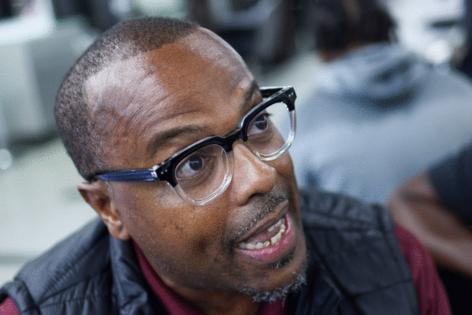
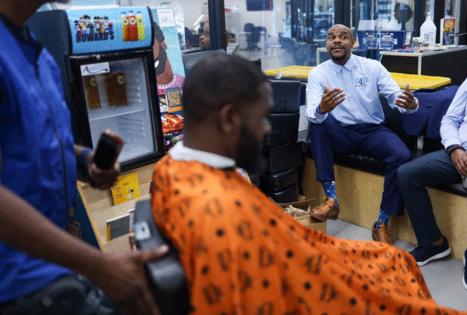
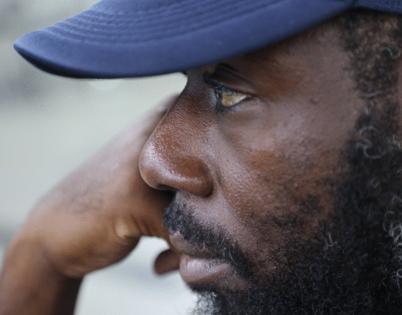
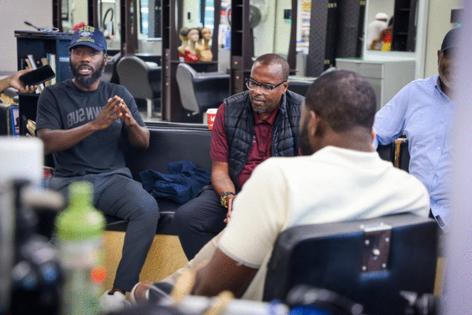
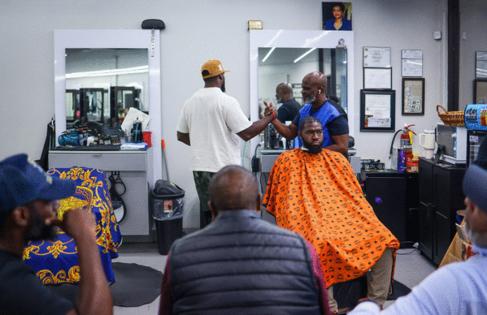




























































Comments